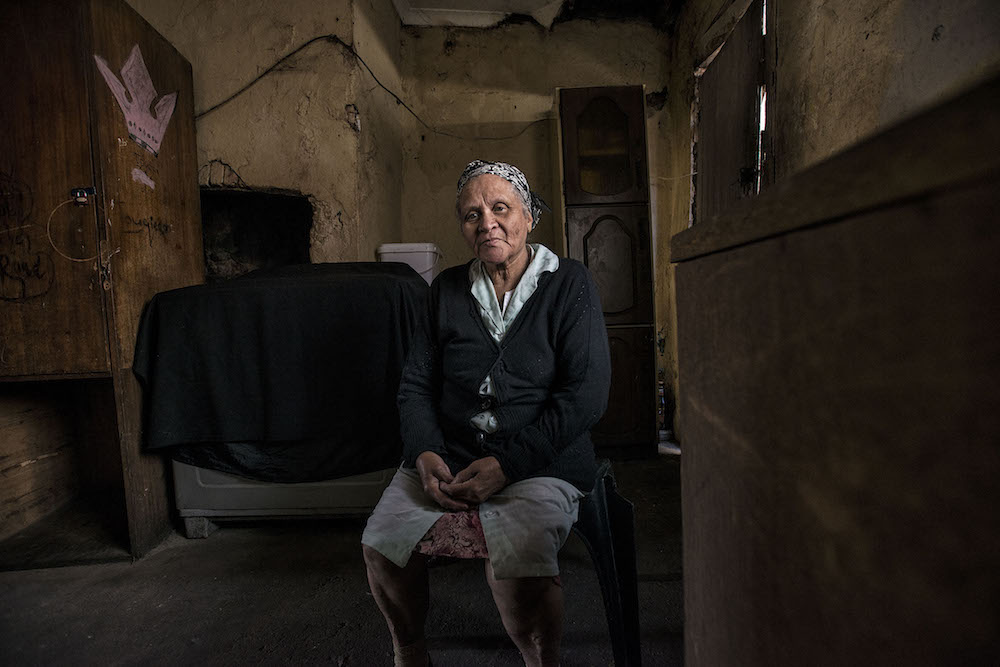A 75-year-old woman who has spent her entire life in rapidly gentrifying Woodstock in Cape Town is facing eviction from a new landlord she’s never met.
The residents of 120 to 128 Bromwell Street are facing eviction by an order of the high court in Cape Town that has given them until the end of this month to move out, with evictions authorised from August 1.
Brenda Smith has always lived at number 128. Eighteen people live in her three-roomed house. She does not know what they will do if they’re evicted. “We won’t get places, the rent is simply too high,” she says.
The Woodstock Hub, which took the tenants to court, says the tenants are in arrears with their rent. The occupants concede that they have not paid rent for two years, but they have been footing the bills for the maintenance the building.
The tenants have had no contact with Woodstock Hub since it bought the property; the first they heard from the new owners was when they received notice to appear in court.
The residents say they tried to reach the new owners, but could not find any contact information. They asked the local subcouncil but were informed that service connections were still in the name of the previous owner. The tenants gave up trying to make contact because of limited resources.
They also say that unnamed people came to them in the past year, offering substantial amounts of money if they moved out immediately.
The Woodstock Hub has no website or contact information. Trematon Capital Investments, a large investment group based in Cape Town, lists the Woodstock Hub as a 50% joint venture. In its 2015 investment report, Trematon notes: “The Woodstock Hub continues to acquire properties in the Woodstock area in Cape Town with the intention to redevelop residential, commercial and mixed-use properties.” No individual property is named.
The company registration names the directors as Trematon Capital chief executive Arnold Shapiro and chief financial officer Arthur Winkler. Another director of the Woodstock Hub, Jacques van Embden, is the founder of Prime Residential Properties, a property developer that also owns the Hub (not directly affiliated with the Woodstock Hub), a new apartment complex a block away from Bromwell Street.
Under South African housing law, tenants are entitled to the entirety of their lease agreement, regardless of any change in property ownership. That means the Woodstock Hub would have to honour the terms of the original lease agreement.

Street of shame: Brenda Smith (75) in the kitchen of her small home in Woodstock, Cape Town, where she has lived all her life. She now faces eviction because a new landlord wants to develop the properties. (David Harrison)
Residents suspect that the Woodstock Hub has deliberately avoided contact with them in order to evict them and avoid dealing with the long-standing lease agreements.
Smith fondly remembers the Bromwell Street community and Woodstock as a vibrant place, even under apartheid.
Woodstock was one of the few neighbourhoods in Cape Town that escaped complete segregation. As a result of its classification as a coloured community, people of all races were able to live close to the economic opportunities in the city.
Today, property listings and urban travel blogs often describe Woodstock as an untouched historical neighbourhood with a “gritty charm”. But the 2006 opening of the Old Biscuit Mill weekly market has spearheaded new and expensive developments in the area, with little economic benefit for the long-standing residents.
Over the years, dozens of residents in areas such as Gympie and Cornwall streets have been evicted. In September 2014, families on another section of Bromwell Street successfully challenged attempts to evict them.
The latest group of Bromwell Street residents to face eviction say they originally hired an attorney named Lyle Hendricks to stop the evictions. They say Hendricks repeatedly told them that the Woodstock Hub had money and they didn’t stand a chance; that if they fought the eviction, the new landlords would immediately demand all the rent owing for the past year.
Regardless, they instructed him to fight the eviction.
Resident Charnell Commando says: “We wanted to fight it, since there is nowhere else for us to go. Besides, I wanted to pay rent but the owners were nowhere to be found. The previous landlord had always collected our money in person.”
In an email sent on behalf of Hendricks, attorney Marcello Stevens said residents had agreed to a proposal submitted by attorneys representing the Woodstock Hub.
The March 31 court order claims to be an agreement between both parties. But the residents say that they had no warning and can only speculate that their lawyer made an agreement without their approval.
The closest thing to a concession to the residents is that the developer “abandons any claims for arrear rental … up to and including 31 July 2016”.
The residents say they will fight the evictions and are planning to hire a new lawyer. They have been holding public meetings to discuss their options. Reclaim the City, a Cape Town-based housing rights organisation, has also offered to help the Bromwell Street residents.
The Woodstock Hub declined to comment on the issue, saying it was an ongoing legal matter. Attempts to contact its attorneys at Marlon Shevelew and Associates were unsuccessful. – GroundUp